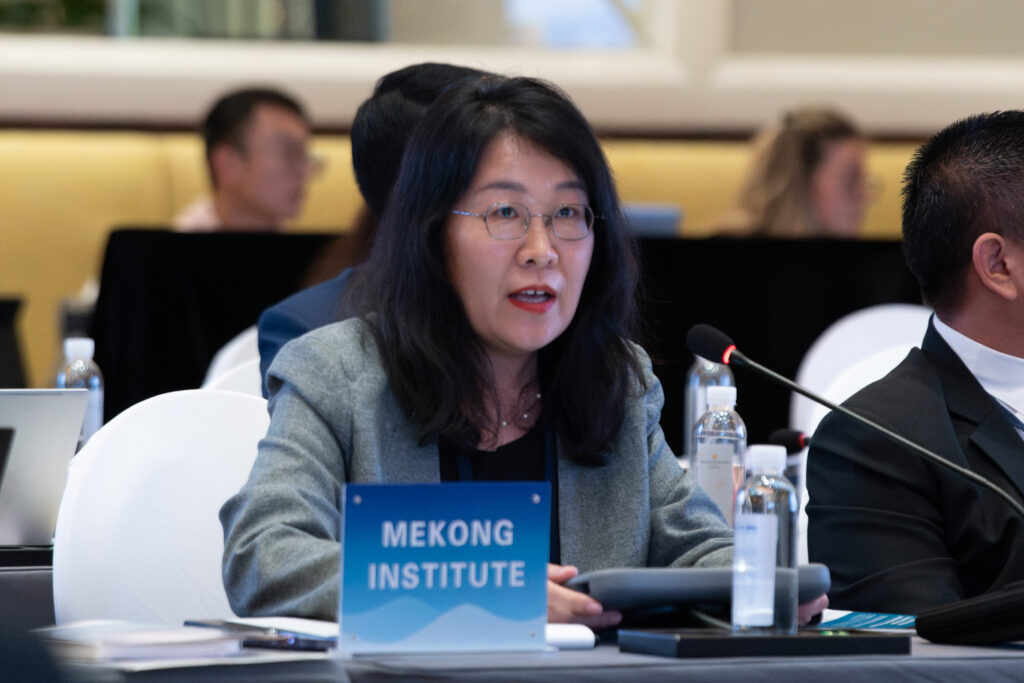Kunming, Yunnan Province, November 5, 2024 – The Mekong Institute (MI), represented by Ms. Guohua Liu, Director of MI’s Sustainable Energy and Environment Department, participated in the annual Development Partners Meeting (DPM) on November 5, 2024, in Kunming, Yunnan Province. Established in 2022, the GMS KN aims to foster regional cooperation and sustainable development in the GMS through enhanced knowledge-sharing, promoting joint research initiatives, and facilitating policy dialogue among stakeholders. As the GMS KN Co-Chair and Regional Coordinator, MI played a pivotal role in this significant gathering organized by the GMS Secretariat. The DPM precedes the upcoming 8th GMS Leaders’ Summit and serves as a vital platform for fostering dialogue among development partners to enhance collaboration within the GMS framework.
Mr. Antonio Ressano, GMS Secretariat’s Principal Regional Cooperation Specialist, presented the concept of the Knowledge for Innovation (KfI) initiative, which is set to be the first activity undertaken through the GMSKN in 2025. The KfI aims to deliver a comprehensive suite of knowledge services and products, including training modules, policy briefs, and communities of practice. The initial focus will be on sustainable agrifood systems, incorporating related sectors such as agriculture, digitalization, environment, energy, and trade.
Following Mr. Ressano’s presentation, Ms. Liu outlined several priority themes and sectors which are critical for addressing the region’s pressing development challenges:
- Sustainable Agriculture and Food Security: Emphasizing the need for climate-smart agriculture and resilient value chains to enhance food security in the region
- Climate Change Adaptation and Environmental Sustainability: Advocating for sustainable resource management and disaster risk reduction to strengthen climate resilience
- Digital and Advanced Technologies: Promoting the integration of digital tools in key areas including governance and public services to improve efficiency and accessibility
- Protection of Vulnerable Groups: Ensuring that development efforts are inclusive and equitable
Ms. Liu also underscored the GMSKN’s role as a centralized hub for consolidating information from various sources, enhancing knowledge mapping and coordination across sectors. This centralization facilitates broader dissemination of information and capacity building through targeted projects, ultimately supporting policy alignment and evidence-based decision-making by incorporating multi-stakeholder input.
“We need strong connections between national and regional entities,” Ms. Liu stated. “Appointed national agencies must link insights from the GMS Knowledge Network to local priorities and regional policies to ensure our knowledge is practical and actionable.”
The meeting was attended by nearly 100 participants, including GMS Senior Officials and representatives from various development partner organizations and private sector. The DPM is anticipated to foster a rich exchange of ideas and strategies among participants, paving the way for enhanced partnerships that will support the region’s economic growth and development goals.
In addition to discussions surrounding the GMSKN, the meeting addressed several key initiatives including the GMS Innovation Strategy for Development 2030, the GMS Digitalization Action Plan 2025-2027, the Regional Investment Framework 2025-2027, and the GMS Gender Strategy Implementation Plan 2025-2030.
As the GMSKN continues to evolve, MI remains committed to leveraging its position to facilitate knowledge sharing and collaboration among stakeholders. This commitment ensures that innovative solutions are developed to address pressing challenges, ultimately contributing to a more integrated, prosperous, sustainable, and inclusive subregion.








